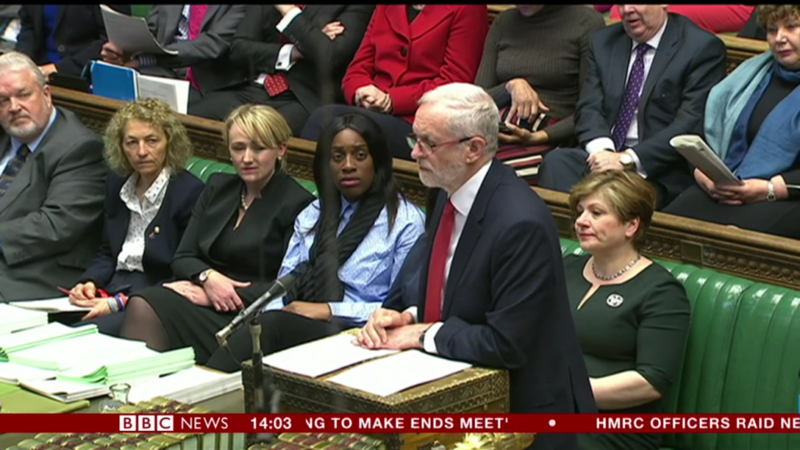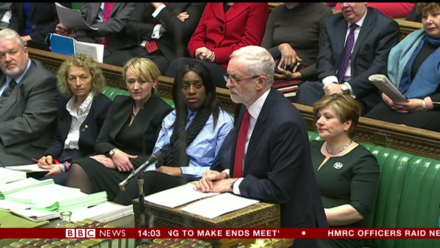

So much for the Brexit election. The final prime minister’s questions before Britain goes to the polls was dominated by rows over Tory spending cuts and years of voter anxiety over how wages have lagged behind prices.
It was angry and energetic but devoid of the fireworks which characterise the best pre-election showdowns. Indeed, in the focus on austerity, the cost of living and the Tory attacks on Labour’s record in government it could have been any one of the jousts between Ed Miliband and David Cameron over the previous five years.
Corbyn ended the parliament where it began – with some of his trademark questions from members of the public, such as Maureen and Christopher.
He has used these over the last 18 months to reveal the reality of Tory cuts in areas such as benefits for the disabled, NHS spending and schools funding. The “people’s question time” approach has allowed him to find a new and quirky way to hold the government to account but the element of surprise has long faded. Neither of the prime ministers he has faced has been badly thrown by the enquiries from voters because they have nearly always come back to the key issues in the two parties’ scrips: Labour investment versus Tory cuts, Tory “stability” vs Labour “chaos”.
And this was roughly the direction in which Corbyn and May took it today.
The Labour leader is more confident than when he started out in autumn 2015 but his attack is broadly on the same lines as when he begun the job.
Today he was able to make strong points about the cost of living, public sector pay and the lack of affordable housing but May stuck to the format honed by Cameron over six years – of attacking Labour’s spending in the run-up to the financial crisis and then laying into a “weak” leader of the opposition.
This repetition is why some of the heat has gone out of PMQs in recent months.
May is a moderated version of Cameron and delivers virtually the same lines about “Labour’s economic crash” but with a layer of nervousness that was rarely seen in her swaggering predecessor.
Corbyn, for his part, has tried to make a virtue of his unpolished approach, and has used the lack of any flashiness to highlight the plight of ordinary working Britons who are struggling on low pay. By contrast, the Tories seem indifferent, arrogant and out of touch.
“Strong leadership is about standing up for the many, not the few – but when it comes to the prime minister and the Conservatives they only look after the richest, not the rest. They are strong against the weak and weak against the strong,” Corbyn said today.
It was one of his best lines and captured nicely the argument he will take around the country in the next six weeks. It was remarkably reminiscent of Ed Miliband’s verdict on Cameron, however, as someone who “may be strong at standing up to the weak… but always weak when it comes to standing up to the strong”.
Several of Corbyn’s policies owe something to Miliband but the same charge of déjà vu could be made against May, who seems to carry round the same dictionary of insults as Cameron, in which the entries for “chaos”, “weak” and “SNP” are particularly well-thumbed.
When the ponderous May finally got around to making her pitch direct to the cameras, she intoned the choice, as she sees it, between her and Corbyn: “Every vote for him is a vote for a chaotic Brexit. Every vote for me is a vote to strengthen our hand in negotiating the best deal for Britain.”
It was hardly a zinger but it was a bit more lively than her opening gambit that “the right honourable gentleman is simply not up to the job.”
That, too, will be May’s message over the coming weeks. She also threw in a standard pre-election jibe about the prospect of a “a weak leader propped up by the Liberal Democrats and the Scottish nationalists” but her pitch was as underwhelming as always. She even made one clear surprise concession – “creating news”, as some spinners call it – in openly refusing to guarantee the future of the “triple lock” on pensioner incomes when she was cornered by Angus Robertson, the leader of the SNP in Westminster. Labour, of course, has pledged to retain the triple lock and put it at the heart of its offer to the retired.
Corbyn will be pleased with his performance because he got his core messages across while May’s robotic speaking style does her few favours. Call it a score draw – but it was just a precursor to 650 gritty battles taking place around the UK.




More from LabourList
‘Labour is being badly misled on housing’
Reeves bets on patience over populism
‘Energy efficiency changes must work for older private renters’